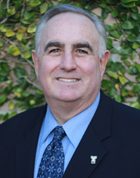A BYU education is not easy to accomplish. But you have retooled, refocused, and refined yourselves by experiencing a university that blends secular and spiritual truths. Congratulations, Cougars.
The sight of this sea of blue robes is impressive and inspiring, and this collective vision is the evidence of your individual dedication and sacrifice. We recognize that your graduation today was not easily accomplished. But then, you did not come to BYU because it was easy.
As the rover Curiosity begins the exploration of Mars this week, let us look back already fifty years ago, when President John F. Kennedy challenged the Rice University student body and the nation to seek new and difficult horizons. He proposed the conquest of literally reaching for the moon. He said:
Some say, . . . why choose this as our goal? And they may well ask, why climb the highest mountain? Why, 35 years ago, fly the Atlantic? Why does Rice play Texas? [Why does BYU play Utah, Boise State, George Tech, or Notre Dame?]
. . . We choose to go to the moon in this decade and do the other things, not because they are easy, but because they are hard, because that goal will serve to organize and measure the best of our energies and skills, because that challenge is one that we are willing to accept, one we are unwilling to postpone, and one which we intend to win. [John F. Kennedy, “Moon Speech” to Rice University, 12 September 1962, Houston, Texas; http://er.jsc.nasa.gov/seh/ricetalk.htm]
Our audience in the Marriott Center today is filled with students who were not willing to accept anything less than the challenge of a BYU education—even when such an education seemed unlikely or even impossible.
Only 56 percent of the freshmen who applied for BYU’s upcoming class were admitted—the lowest acceptance rate ever. One of your fellow graduates, Megan Nelson Olsen, was a casualty of the tough admissions standards at BYU as a freshman, but she refused to abandon her dream of graduating from this university. She persevered and developed a new plan. Her goal was clear, and, even when she got discouraged, she relied on prayer and never stopped believing in her goal. After excelling in her studies, Megan was admitted to BYU winter semester 2010. Megan’s experiences at BYU and, also important, the process of getting into BYU, were life changing. Once admitted, she was an enthusiastic student body member. She felt it was a blessing to study here and never took her opportunities for granted.
Another student, Bryon Glazier, is also graduating today, having completed the executive MBA program. This program allowed Bryon to return to BYU after eight years and pursue an advanced degree while supporting his wife and their growing family. His wife, Sherry, had previously postponed her own BYU experience when she discovered a cancerous tumor in her leg just weeks before her freshman year was to begin. When Bryon entered the program, Sherry was pregnant and caring for their four-year-old twins. Bryon sacrificed sleep, time with his family, and even attending BYU sporting events. Everyone who knows Bryon knows this was a tremendous sacrifice. (Although he does admit to missing one class to see Jimmer play in his last home game.) Through the perseverance often required by struggling young student families, Bryon and Sherry learned they could do hard things in the short-term to achieve success in their long-term goals. Although graduation diplomas are individually awarded, they are often the result of a combined effort.
Many of your sacrifices mirror the experiences of these students. Make sure you take time today to thank all those who have helped you to be here today. Congratulations to Megan, Bryon, and all of the graduates for your tremendous accomplishments.
Allow me to share some counsel that President Gordon B. Hinckley offered at BYU’s 1999 commencement:
Go forward now with your lives. Take from this institution the faith that has nurtured and sustained you while you have been here. Take with you the great values under which you have lived while you have been here—not only the knowledge that you have gained in your classrooms but also that inner thing which speaks and says, “I can do a little better than I have been doing.” Take that with you, please. [BYU commencement remarks, 12 August 1999]
Continue to give your all in all that you do. Take with you the pride of being a BYU graduate. Give back to the university whenever and however you can. Take a moment to reflect how far you have come.
A BYU education is not easy to accomplish. But you have retooled, refocused, and refined yourselves by experiencing a university that blends secular and spiritual truths. Congratulations, Cougars.
As president of the Alumni Association, I hereby confer on each of you lifetime membership in the Brigham Young University Alumni Association. Again, we offer our congratulations and welcome you into this great association of more than 370,000. You will have many opportunities to join your fellow alumni in meaningful activities associated with the university.
In the sacred name of Jesus Christ, amen.
© Brigham Young University. All rights reserved.

Michael O’Connor was president of the BYU Alumni Association when this commencement address was given on 9 August 2012.


